![]()
See some of my "belongings": |My Book List | Archive Pictures |
![]()
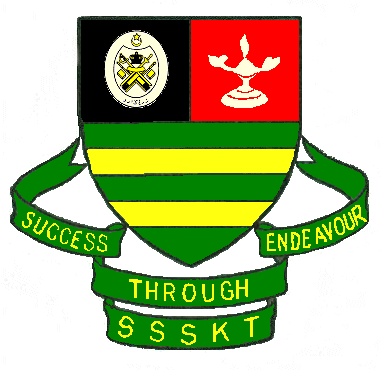 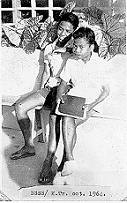
Mohamad Awang (left) and me posing in one late morning after prep-class, on the flower bed of A Block hostel facing the dining hall. 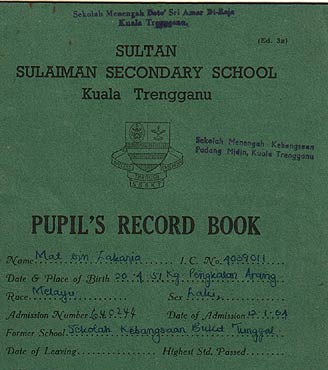 |
SS was then the most pretigious school in Terengganu, in Kuala Terengganu precisely, on the beach nextdoor to the Sultan's Palace, the Istana Badariah. The compund was very large, the fields extended to border with the Palace fence. There were two long double-storey blocks of classrooms, and another two shorter blocks. There were two blocks of double storey boys hostels, all together twelve rooms, about fifteen boys in a room. The blocks were on the beach side of the compound, and in fact a high wall right on the beach was built to mark the furthest a student could go to the beach. The wall also served to block the high wave from strong monsoon wind from reaching the hostel.
In January, the monsoon was at its peak, the blowing wind sang the sleeping song, with the coconut and ru leaves melody all days and night, and that carved a permanent nostalgia in my memory when I first started my hostel life here. The school was attended not only by the brainy boys of Terengganu, but most importantly by the wealthy kids whose grey matter did not measure up in boarding schools like MCKK, STAR, MGC, etc.
We were actually squatting in SS for a couple of months. My seniors had been squatting there for many years. Our own school would be ready soon, not near here, but somewhere more uphill. We were actually Malay-Medium students. We were among the pioneers to study in secondary level through the medium of Malay as the medium of instruction, then all secondary schools in Terengganu, in fact in Malaysia, used English as the medium of instruction. My most senior fellow linguocomrades were in Form Five. I did not know how they came about that senior. I chose, or rather I was with my mother to choose Malay Medium school not because my grey matter was not sufficiently dense. It was because of the fees. In SS the fees would be six ringgit a month, excluding nine ringgit hostel fees, plus books. That would require fifteen ringgit overhead. In Malay medium school, the fees was six ringgit a year. With my father and my mother earnings so irregular, and my brothers and my sisters feeding so regular, I did not bother to seek advice of many relatives in making the irreversible decision to go to Malay medium school. Many years later I was told by my mother that some of my relatives were not very happy with my mother's brave decision to let me go on to the secondary school, and especially to non-religious school.
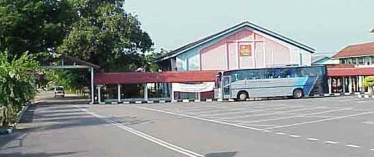 The SS hall in 2003; not much different from the 1964, apart from the flora and the paint works. The road on the left was leading straight to the boys hostel by the beach. There was no school bus and the covered path trangressing the hall. The right building was the school office and the staff room. I went to the office twice only in 1964, to collect my two FMS three-monthly installments; there was no tarmac either on the courtyard between the hall and the office. There were lined big jambu air trees along the side of the hall, under which every afternoon we lined up (six form one MM classes altogether) before marching to the class. CheGu Razali Haron supervised the 'assembly'. |
I was in Form One, precisely 1AM. The extension 'M' was indication of Malay medium, differing from the conventional English medium, and it was in the afternoon session. Those who opted for the English medium went to Remove Class, learning mainly English. On the first day, we were met by Pak Ngah Him, Mak Long Su's son, a very close relative of my mother. He, his actual name was Mohamad Abu Bakar, was then in form four, just through his LCE, English medium, in Commerce class. And he insisted that there is no way I could commute from home to school every day. So, with his 'supervision', my mother decided that I would stay in the hostel, and he would make the necessary arrangements. On the first day, we returned home, early, to catch the last bus from KT to Batu 6, at about five.
My mother sent me to school again the next day, Monday, with a very simple preparation. A sleeved kekabu-pillow, a patched white short, a last year blue short (std six), a sarong (no towel), some small personal items, wrapped and rope-tied in folded kerchut mat, plus another patched short and a white shirt I was wearing; no books what so ever; the primary school leaving cert, my IC and birth-cert were folded and in my shirt pocket (my belongings was added with a Batu-Enam-Itam tailored white khaki short paid by AyahLi, and a casual white-flowered spotted light green shirt my mother sewed for me during my first term home-break in April). The night before, my mother asked me to sleep beside her, for she said I would then be away from her for a very long time to come. I did not, because I felt I was grown up enough, but she was right for the being away from her. It was before noon when we reached the school, and with PakNgah Him assisted, I was registered in A block, room number 2. I did not remember saying good-bye to my mother, but I did not feel scary being away from home. When she left I had only twenty-five cents in my pocket, the most she could leave to me, just enough for my bus fare, which was ten cents to KT bus station then another fifteen cents in another bus to Pengkalan Arang, in case I had to go home. I did not pay anything to the school or to the hostel because my mother did not have any money, and the teachers invested for the credit on my SSE results which under no circumstances would it not be awarded with a Federal Minor Scholarship.
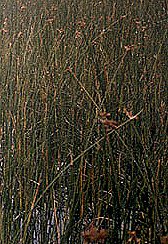 Scirpus mucronatus (kercut) were widely grown in marshland of the hinterland. They were cut, bundled, and transported to cottage mat makers (like Che Wan Bakar in my place). To make the mat, they were soaked in a thick muddy water (celup) and sun-dried. They were then pounded by a lance-wooden pestle on a flat wooden bed to flatten (tumbuk), after which each piece was entered into a certain woven pattern (anyam). No specialised tools were needed, only finger-skills plus a sharp knife to trim the finishing. A mat of about 3 by 6 ft cost less than a ringgit. A mat made from this flora was my only cover on my bed in SS hostel all along in 1964. |
The warden for the A block was CheGu Ghani, and for the B Block was Mr Nava. Both had a VW Beetle, the most prestigous casual car at the time, parked right in front of the hostel block. The hostel captain was Mohamed Derus, an English Medium Fifth Former. He shared a frontage room on the ground floor of A Block with a fellow prefect, Yahya, who was the school HB. I onced glanced into their room, and it was a very cosy-looking with individual study table equipped with individual table lamp and beds well-managed with framed mosquito net to look so nice. Looking at my bed, I could only wish to have such privileges; the wish I was actually granted in even more elegant 'penthouse-like' accomodation in 1970, by beeing the HB of SAS in KL.
After two weeks I returned home for a weekend. My mother told me that she was applying for the Welfare assistance for my schooling, helped by Che Wan Nawi, the village assistance head, and he told me that book loan was approved for me, ready to be collected at Pustaka Timor in Jalan Banggol. So, the following weekend I went to the said bookshop, and checked my name, and collected some of the books, many were translated versions published by DBP, all brand new for the old stock, collectable at another place, were already out of stock. At about the same time, forms of the prestigious FMS were distributed by the class teacher to those with an A in SSE, ten of us in the 1AM class. I filled the form. At the hostel, when Pak Ngah Him visited me, he incidentally saw the form, before it was due to be submitted. He pointed a glaring oddity: that I wrote five ringgit as the monthly income of my family which was very true to me. He took a while to get me understood in that case that, I have to lie to survive. He suggested sixty ringgit instead to make it sensible, and I agreed the change be made in the form even though my heart wanted to throw up the fifty-five ringgit lie. He was right. In late February the decision arrived. I was awarded a FMS, with all the nine others, twenty-five ringgit a month, an amount more than enough for me to become independent of my mother's income; and the first payment arrived in late March, back-dated from January, announced through the PA in the class to be collected in cash in the school office immediately.
I paid all the dues, and deposited the rest in POSB Kuala Trengganu the week end that followed. It was so much money for me that I did not know what to buy, and one of the thing I bought at KT bookshop which I regretted very much later for the waste, was the two-ringgit adjustable rubber-stamping set, a 'toy' no other students knew its existence at the time. It nonetheless stamped my name on every book I bought. With the award, I was obligated to withdraw from the Welfare list, and I returned all the books which I took from Pustaka Timor. I bought all of them for replacement. And with the award, very meaningful to me, only myself could foolishly undo its right track.
With my own 'income', I could go home and return to the hostel 'honorably' like other boys. I stayed at the bus station with more confidence while waiting for the next bus either to my place or to the hostel; otherwise I was always scared. I could buy the drink when I felt thirsty (a ten sen per bowl ABC), I bought a few turtle eggs (- the big leather back's - ten sen each - the delicacy my relatives in Mengabang Telung promised whenever we were visiting them, but could not deliver) to take to the hostel, I bought a bundle of green-fresh limau lakap, still in their stalks, for my brothers and sisters at home (one ringgit for 15 or 20 pieces), I bought a towel to get dried after bath in the hostel, and I bought a fountain pen which I reckoned would last for quite sometimes; and I bought a proper bag (a blue squared split-opened of 1 by 2 ft) to put my books in and another one, a yellow sling to put my dresses and other sundries. On my final return trip from SS hostel in Dec, I carried these two bags and another tied folded mat with the pillow in it.
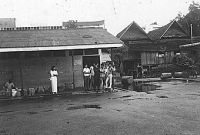 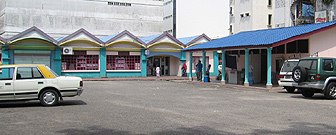 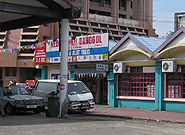 Kuala Terengganu bus station in the mid 1960, viewing towards the left from the shed consisting of a cafe (very delicious roti canai), passengers waiting benches, and a rows of express bus ticketing offices; the imfamous toilet which got its catch-phrase among the locals. This was an early morning view. Normally in mid-day this place was full of people, searching for their ways to go home carrying their goods. |
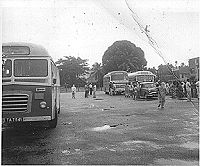 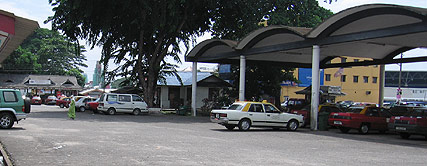 Another view from the same spot. More bus sheds were on the right side of the picture, including the Marang Bus, which would take me to SS, and Jertih Bus and Batu Rakit Bus which would take me home to Batu Enam. Under the connecting shed, there was always, among the goodies sellers, a shabby-dirty mid-aged blind woman sitting with a hand opened out asking alms from the passerby while singing "Ya Aini,..." which always radiating out a remind of my recently lost loved sister. |
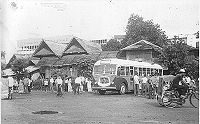 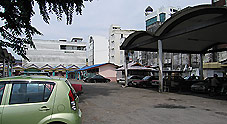 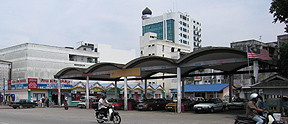 Viewing from Jalan Masjid junction. The ticketing offices and bus sheds were on the left side of the picture. Hoover Hotel, the only decent hotel in Kuala Terengganu, is on the background. Connecting to Jalan Banggol is on the right. |
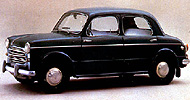 The car I remembered CheGu Saadiah drove; blacky in colour; the front door opened at the front. Perhaps it was a Fiat. CheGu Saadiah was my class teacher in Form One. The car I remembered CheGu Saadiah drove; blacky in colour; the front door opened at the front. Perhaps it was a Fiat. CheGu Saadiah was my class teacher in Form One. |
I noticed a teacher, most of the evening, in the hall practicing or teaching gymnastics. He attracted my attention so much, then suddenly I realised that he disappeared, but I kept on hearing the students conversation about a good gymnastics teacher in the school. He was CheGu Razali Abdul Mutalib and that his aurora in the assembly hall was in my memory for so long because I was destined to meet him again, in person, in different environment, after many long years later, in 1993, twice; once in his office of Nazir in KT, and another at his home in Panji Alam, with all the family members. The 'repeat scene' began on Monday Dec 14, 1992 when we sent our second daughter Malini to TKC Seremban to begin her form one schooling; we were greeted by her CS prefect named Karena. On further acquaintance she, then a form-fiver, was the daughter, the youngest, of CheGu Razali Abdul Mutalib. Having a perfect restarting point I made an effort to meet him. And I met him on March 23, 1993 in his Nazir Office (Bank Pertanian Building), introduced by Pak Ngah Him, who was also a Nazir, and on business of concluding the transaction of selling his land in Wakaf Tengah, to me and my brother Num. It was a short meeting, but I extended the meeting three days later, on Friday March 26, a day after Aidil Fitri, with all the family members at his home in Panji Alam. At the meeting, my wife met also her former teachers, visiting, happened to be friends of CheGu Razali's wife, Puan Khatijah who was a retired teacher to do her business in handcrafts. And at the meeting, I asked him of his sudden disappearance in 1964; I got the answer: he went to New Zealand for further training.
Back to the hostel, the dining hall was between the room blocks. We had lunch earlier in the afternoon since we were in the afternoon session, but we had dinner together with all the hostel boarders. In every lunch and dinner, the desert was a green apple. It was the first time I ate apple, and its aroma was very nostalgic. Before we start the dinner, a prefect would read a prayer, in English, "We all remember all the good things for the day, Amen", and all students were waiting to amuse Zakaria's turn to read the prayer, because he was a stammer.
I did not have the idea of ragging among the hostel boarders, and I was not warned so by any body, but the idea slowly came into being as I moved on. However I was not abused by the seniors, probably because I was not attractive enough judging from my bed attire in the dorm, or perhaps because my next bed neighbour, on my left, wall-site, was a form 3AM senior named Wan Ahmad Khalid, a smart, handsome with an Elvis curly hair, well-dressed good-looking boy. He helped me on many occasions. One day in June, I found out that someone had stolen my POSB passbook and managed to draw fifty-ringgit from it, and unwisely put back the passbook in my locker from where he took it. He left for me only five ringgit in the account. I reported the stealing to the hostel captain who quickly started the investigation. That night it was a big story in the hostel and during the prep-class, for the thief managed to get the money drawn from POSB passbook, since it needed a thump-impression to get approved. Immediately after the night prep-class ended, the thief came to see me, took me to Mak Jah tuck shop just outside the school compound for a bowl of 'bubur pulut hitam', and on the way back he admitted that he stole my money, knowing that I was a FMS recipient and had some deposit in POSB. He unfortunately was Wan Ahmad. He promised to pay me back monthly and we settled it with the captain. However, it took me the next month to get the first fifteen ringgit. I wrote a letter to his brother, who was his guardian, in Dungun telling him the incident. His brother, despite getting frustrated and angried with me, settled the money in two monthly installments, cash-registered directly to me to the school. I told my mother of the incident, but she could only monitor the progress. That was the first time I handled my matters alone, successfully, without my mother's help. Not long after that I moved to the opposite row in the dorm. As some of the students had in their locker, I also had a small hot water thermos (the hot water was available from the kitchen, a small cup, and sometimes a tin of milk, a margerine pack, and thus completed with pack of biscuit for supper after night prep class (instead of going out of the school compound).
The most notorious boy in the block, a form two English medium, happened to be staying in my dorm too, a few beds away to my right. He was nicked Mohd Kera, and his activity was 'painting' the boys face with fabric paint at night when they were fast asleep. He had the paint for his art class, as had every body for the subject. It took a thinner, not soap, to remove the paint. Many boys got his manace, including me, once. At one time the food in the hostel was so bad, that prefects led the students in a protest. The warden wanted to know the leaders and with the prefects taking part obviously he met with the incooperations, until he met a boy, a form one English medium, who liked chicken so much, at any cost, in his meal. With the bribe in a restaurant in KT, the warden was told everything. However the prefects were forgiven, but the boy, since then was nicked Ramli Daging Ayam (Chicken Ramli), and secretly the prefects asked the profesional job of Mohd Kera to teach Ramli. He went home for two weeks. When he returned to the hostel again, with hairless head, everybody knew that he got the paint more than just on his face.
A big boy, insane-looking, by the name of Syed came to find me one evening, and said he wanted to harm me. He took my hands by his hands, laid me down on my back on my bed, and fiercely spitted in my mouth, a disgusted act that I could not forgive. I wept for the first time during my stay in the hostel. I did not tell any body, including Pak Ngah Him because I felt so embarrased from the most evil act which I could not defend myself. But, later I found out that he was truly an insane boy, a form one English medium, disappeared from the hostel and from the school altogether.
In SS in 1964 and the years before, there were afternoon classes for Extension School (Sekolah Lanjutan) catering the LCE drop-outs as a second chance. If they make in the Qualifying Test at the end of the year, they would be readmitted in form four the following year. But the students did not stay in the hostel, and thus the hostel did not have the experience of handling afternoon session students in the morning. But this year, my batch was SS students, some of them like myself were hostel boarders. There have never been prep-class in the morning, so the hostel had to make one from this year, seeing that we did nothing in the morning. The class was held in the recreation room of the A Block from eight thirty to eleven. And I was picked by warden CheGu Ghani to become the 'prefect'. My job was to keep the class in order, that is to make sure that students were studying or doing their homeworks during the class, and to watch that they do not make any manaces. I also had to keep the attendance register everyday. The register had to be endorsed by the warden by ten thirty in the morning which I normally accomplished by seeing him in the school tuck-shop while the teachers were having their refreshment during the school recess. And I never had any problem with the job because all the students were of my batch, and there were only about thirty of them, less than the size of a class.
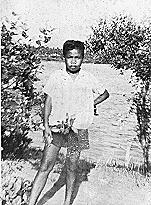 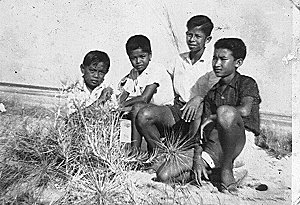 My very first picture, posing in the Ibai lagoon, on a leisure Friday evening trip, sometimes in June 1964, with hostel mates (right picture from left): Arifin Musa F1M, Ali Embong F1M, Ismail Taib F4M (readmitted from Extension School last year), and Azmi Ambak F2E. The shirt I was wearing was the only casual shirt I had throughout 1964. I did not have casual pant, the pant I was wearing was my Std 6 uniform last year. |
Most of my class-mates, about thirty five altogether, were of my type, I knew it from their books, their dress and their words, but only Anuar stayed in the hostel. His many friends from Dungun were also hostel-boarders, but in the English Medium. I began befriending Hashim Anang from the lines we made under the rows of big 'jambu air' trees before entering the assembly hall, then into the class, every afternoon. We were always side by side, or next to each other. He was from Marang, and I almost saw him everyday getting down from the bus that took him to school. He was a very kind, gentle and honest boy. In the class he sat at the back row, while I sat on the second row, second last column (near the windows). There were about ten girls, but none I had known before. Apparently there was a block of girls hostel, on the other side of the compound, close to the trunk road. I came to know later that Mariam, from Bukit Besi, Dungun, the class monitor, was a hostel boarder. She befriended quickly a 'local' from Losong name Zawiah. Not much stayed in my memory about the others, at least not yet at that moment.
 Alamin in 1975, a teacher in Adabi School, K. Terengganu. An upper six student of his was named A'esah Abdul Rahman, to whom in October 1976, I was married to. Alamin in 1975, a teacher in Adabi School, K. Terengganu. An upper six student of his was named A'esah Abdul Rahman, to whom in October 1976, I was married to. |
 An Alamin's colleague named Fakurazi. In 1967 he was my three years senior in SAS. An Alamin's colleague named Fakurazi. In 1967 he was my three years senior in SAS.
|
October 1, we moved to our new permanent 'campus' in Padang Midin, and naturally the school was named Sekolah Menengah Kebangsaan Padang Midin (SMKPM). Every one was happy, including our new HM, CheGu Nordin Nasir, and every class from form 1 to form 5 was in the morning session. The hostel was not yet ready, so those who had to stay in the hostel, continued to do so in SS, including myself. A chartered bus, ten ringgit monthly ticket, ferried us in the morning and afternoon.
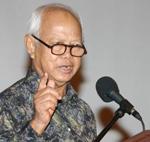 CheGu Nordin Nasir, the Headmaster to 1967. Pic post-1980 from pages of an alumni of MCKK where CheGu Nordin was the Headmaster 1975-1977. CheGu Nordin Nasir, the Headmaster to 1967. Pic post-1980 from pages of an alumni of MCKK where CheGu Nordin was the Headmaster 1975-1977. |
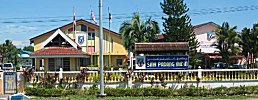 SMKPM in 2003. |
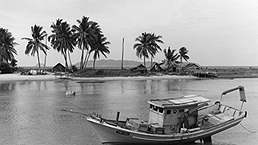 Across the lagoon, on the beach, facing the open sea, fishermen get together to talk about their profession, in the cafe where Hashim works. The lagoon dries up at low tide, so the fishermen knew when to go and when to come back. Sometimes, some of them deliberately make themselves trapped by the tide, so they spent the night on the beach. (Kapas Island is in the distant background of the picture) |
I realised many years later that the move was actually at a cost, the significant of which depends on which side one is on. To me it was rather dear. It cost my friend, a class-mate, closest than all others, none other than Hashim Anang. He commuted to SS by bus and the timing was just as suitable since it was afternoon session. Padang Midin is on the western side of KT, and one has to take another bus. If he wanted to continue to commute when we have moved, there was no way he could reach the school at seven every morning from Marang. Unfortunately he, and perhaps with the support and suggestion of his parents decided to stop schooling. As told to me, he was going to help his uncle manning a coffee shop on the beach of Marang estuary whose customers were mostly fishermen, and the uncle he said he was going to work with was a YB. When we moved in October, he actually stopped coming to school. He wrote letters to me saying that he had stopped schooling. I replied his letters. We kept in touch through the letters until the end of term in late November when I decided and braved myself to go to visit him and his family in Marang.
So, I told him that I was going to visit him. He was very glad and gave full instruction on how to get down, and I was actually visiting him, I went on Saturday morning, the morning after I returned home from the hostel (for good in SS) for the final term break; the first bus I could catch from my place, and I stayed one night with his family. His father, Pak Chik Anang, was a very nice person; hashim did not have many brothers and sisters. I found out that his family was not that poor after all, in fact he was one million times richer than me. Then why did he decide to stop schooling? And what did his parent say? I did not try to probe the questions further during the visit, in fact I was drowned in the hospitality of Hashim's family, the kind of hospitality I usually enjoyed from my relatives in Mengabang Telung who brought my mother up. I was even offered to take home a pair of pigeons by his father which I turned down because I would not have the time to bring the birds up.
Apparently that was the last time I saw him. In the years that followed, I was careless myself, I was sort of in natural entropy, and we were loosing each other. We finally lost each other. In the late 80's I had a chance to stand right on the spot where he met me as I got down from the bus in December 1964. However, from there I could not see his house anymore. Things had changed very much. I was in a hurry too. Again, in mid 90's I had another chance. But, the spot I was standing in 1964 had changed again. I met an old lady food seller near by, and asked her about Hashim if she knew; and yes she knew. And she knew Hashim's father, PakChik Anang to her, and she said he was here, right where I was standing, ten minutes ago. She said that Hashim was not staying in Marang now, but she did not know where. At that very close point, my children and my wife was pushing me to go on with our drive back to KL. I could have ask them for another ten minutes or so, but if they do not understand who is Hashim and his father to me, that could mean a bumpy drive back to KL.![]()
Edition dated May 2003